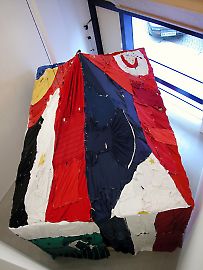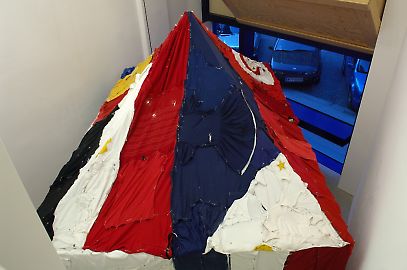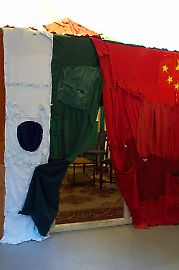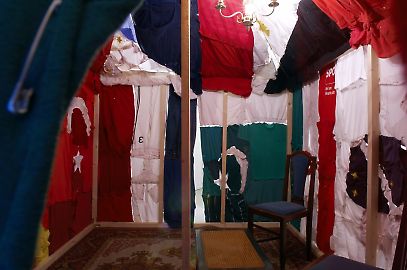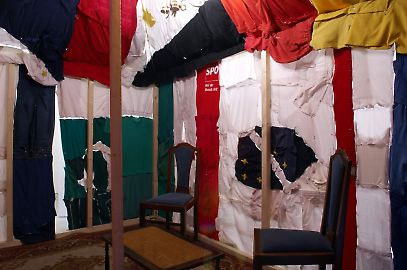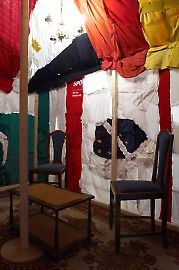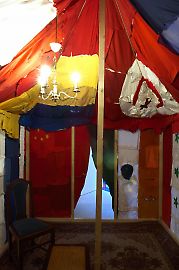Costa Vece --
Costa Vece, born 1969 in Switzerland to Italian/Greek parents, became known internationally after participating in the 1999 Venice Biennal. Since the start of his career Vece prefered to work with cardboard and recyclable materials. His work presented in the Georg Kargl Box is yet another take on the topic Revolution – Patriotismo, a project shown around the world and that was originally started by Vece in Geneva in 2005. It will now be shown in Austria after travelling to Turin, Rome, Berlin and Amsterdam.
In this series of installations, Costa Vece engages with spaces as a whole by filling them with simple, everyday objects such as bricks, barbed wire and clothes found at flea markets, making the viewer feel both physically and psychological besieged and aware of his position as a continually changing social and political entity. While Vece defined his installations in Switzerland and Italy as delimited territory to which only he and the population of the respective country were allowed entry, the installation at the Georg Kargl BOX is accessible to all visitors. He has set up a tent occupying the whole room within the architecturally and functionally codified frame of the gallery using the national flags of foreigners from non-EU countries living in Austria. He thus focuses on those “second class” citizens who form armies of cheap, partially legalised, migrant workers in the construction or services sector. Each individual flag is made of used and discarded garments such as t-shirts, socks or jeans which bear traces of use and of the places of production the world over. By being used for making an artwork, the garments are torn out of the anonymous sphere of commodity circulation and placed in a tangible local context. The tent is furnished with a lamp, chairs, a table and a TV set, defining a private space within a public and institutionalised gallery space, a country within a country that fulfils the basic human needs of shelter and security. The idea for making a tent for Vienna was inspired by Muammar al Gaddafi’s tradition of representation. On his State visits abroad, the potentate always brings along his Bedouin tent in which he then holds his receptions.
Vece’s point of departure was the reflection of his personal social status as a member of that “in-between generation” in Switzerland who, though born in the country, had no right to vote as long it was not in the financial position of making adequate contributions to the State. A referendum held last year for a change in law to accord third generation immigrants automatic naturalization and for shortening the waiting period for naturalization was rejected by a majority of the population. There is a growing intolerance within the EU towards foreigners due to the temporalness of borders and the continually expanding net of global societies. Right wing groups are turning against the progressive fusion of cultures caused by immigration and the declining significance of national states. A conservative way of politics consisting of fear and exclusion that makes an enemy of every foreigner still has a large clientele in this country as well.
By breaking the rules of the hierarchical system and by reverting and equalising the distribution of power among the excluded and the rulers, Costa Vece questions the socio-political orders and value systems depending on social, economical and political contexts. The global and the local merge in his socio-critical record of a present that is undergoing an ever faster and globally unified structural changes. He therefore turns our attention to the instability of the human condition and the misanthropic and unfriendly atmosphere. Revolution – Patriotismo can be read as hope, as taking pause in the midst of globally accelerated crisis and turning the gaze beyond all imposed limits towards an enlightened form of being together rather than of a cultural opposition to each other. “I want to start a revolution. Switzerland never had a revolution. I had the vision of creating a kind of 'Non-State' in which everyone is welcome.”


